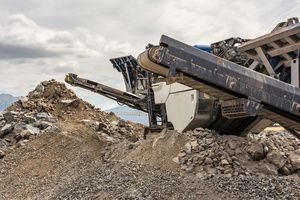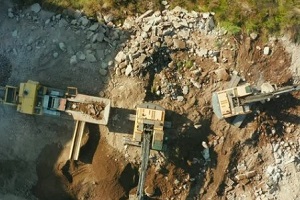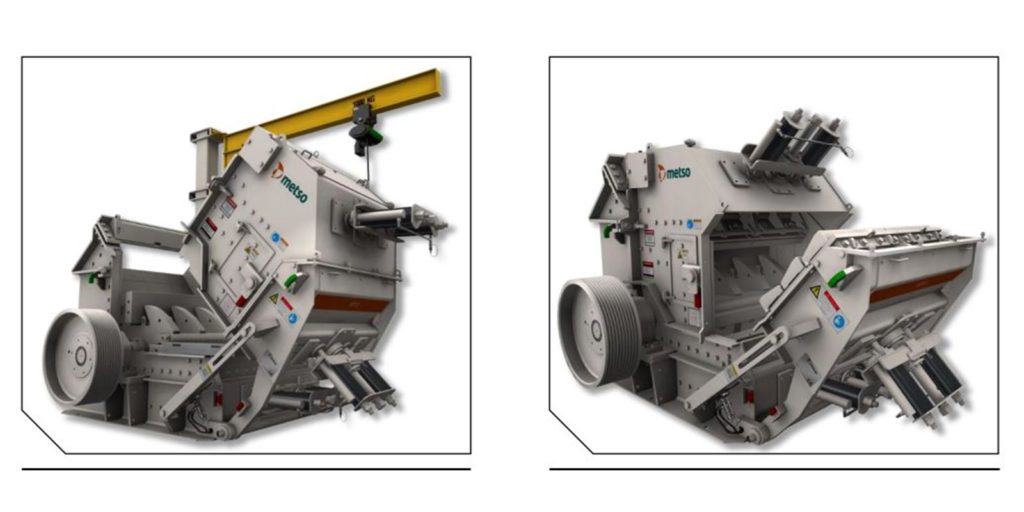You need an efficient rock crusher for crushing stones, concrete, gravel, or other materials. Impact crushers use high-speed impact forces instead of compression to crush material. There are key differences between horizontal shaft impact (HSI) and vertical shaft impact (VSI) crushers, and understanding them will help you select the best impact rock crusher.
How Impact Rock Crushers Work
 Impact crushers use striking and high-speed impact forces to crush material. Instead of compression or grinding, the particles are accelerated toward breaker blocks or other hard surfaces at speeds of up to 1,200 feet per second.
Impact crushers use striking and high-speed impact forces to crush material. Instead of compression or grinding, the particles are accelerated toward breaker blocks or other hard surfaces at speeds of up to 1,200 feet per second.
The rapid collisions shatter and fracture the material along natural fault lines, creating a uniform final product size while consuming less energy compared to compression-style crushers.
In an HSI crusher, a horizontal rotor shaft spins rapidly to deliver powerful blows along the chamber’s length using bars, hammers, or plates to impact material. In a VSI, a vertically oriented rotor spins and propels rock against enclosed chamber walls or curtains at speeds up to 75 mph for crushing.
Critical Differences Between HSI & VSI Impact Rock Crushers
There are some distinct differences between HSI and VSI impact rock crushers regarding how they operate, maintenance requirements, production efficiency, final product shape, and the types of materials they work best on.
Impact Force Direction
The primary difference between HSI and VSI crushers comes down to the direction from which the impact forces are applied to the material. With HSI crushers, the rotor hammers or blow bars strike the feed horizontally, delivering the crushing force along the rock’s natural crack and fracture lines.
VSI crushers propel the feed vertically using centrifugal force to throw material against anvils in the crushing chamber for fracture and fragmentation.
Maintenance & Operating Costs
VSI crushers generally have lower operating and maintenance costs than HSI crushers. VSI crushers have fewer moving parts, as they do not require blow bars or hammers to be replaced frequently as with HSI crushers.
The wear parts in a VSI last considerably longer before needing replacement, reducing downtime for maintenance. VSI crushers are also more energy efficient than HSI crushers due to the design and limited friction involved during operation.
Production Efficiency
For their size, VSI crushers can achieve higher throughput capacity than HSI crushers. The open feed hopper accepts large feed sizes and allows high volumes of material to flow through, while the rotor easily handles rocks up to 16 inches. For secondary and tertiary crushing applications, VSI crushers have a higher reduction ratio, meaning they can efficiently create smaller end products.
Particle Shape
Due to how the impact forces are applied, VSIs produce a more cubical product shape than the elongated and flaky particles created by most HSI crushers. The rock-on-rock crushing method minimizes flat and elongated particles, allowing for excellent shape for ready-mix concrete applications.
Less particle surface area also reduces the amount of mortar needed between aggregates.
Materials Handled
An HSI crusher is suitable for crushing soft to medium-hard materials, such as limestone, gypsum, lignite, coal, coke, weathered shakes, and phosphate. The horizontal shaft impactor is better suited for softer, less abrasive stone.
VSI crushers can handle hard and abrasive rocks, such as granite, gravel, trap rock, and basalt. In construction and demolition recycling, a VSI handles materials, such as concrete, marble and ceramic tiles, far better than a horizontal shaft impactor.
Noise & Dust Generation
With lower vibration levels and dust emissions, VSIs have fewer environmental and operator concerns compared to HSIs. The enclosed design of a VSI crusher prevents dust and noise pollution. Less dust also reduces clean-up time and maintenance costs.
HSIs are noisy and release more dust as the discharged particles and internal components collide with each other. More dust suppression and operator protective systems are needed to control workplace hazards.
Impact Rock Crusher Applications
Impact crushers can fulfill the role of primary, secondary, and tertiary crushers within a crushing circuit. The type of crusher you need for your operation depends on your site-specific conditions, production requirements, and the properties of the rocks being crushed.
- Primary Crushing: VSIs and HSIs can operate as primary crushers. VSIs handle hard, abrasive materials. HSIs crush softer materials.
- Secondary Crushing: Both can produce well-shaped aggregates and sand for construction. Tertiary crushing might also be required.
- Recycling: For concrete, asphalt, and C&D debris recycling, an impact crusher efficiently fractures material along natural fault lines.
Choosing The Right Impact Rock Crusher
The right crusher depends on your material, production requirements, and site conditions. Compare how HSIs and VSIs differ in terms of:
- Material properties
- Production volume and reduction ratio
- Particle shape
- Operating and maintenance costs
- Environmental factors
 For example, for medium abrasive stone in secondary or tertiary applications producing concrete aggregates, a VSI has advantages. But for larger primary crushing of softer, less abrasive limestone or concrete and asphalt recycling, an HSI can be a good choice if you need fewer fines.
For example, for medium abrasive stone in secondary or tertiary applications producing concrete aggregates, a VSI has advantages. But for larger primary crushing of softer, less abrasive limestone or concrete and asphalt recycling, an HSI can be a good choice if you need fewer fines.
Examining the types of materials you will be crushing alongside your production goals will guide you toward the right impact rock crusher design.
Find The Best Impact Rock Crusher For Your Needs With Mellott
Choosing the right impact rock crusher for your application requires careful consideration of the key differences between HSI and VSI crushers in terms of their crushing methods, production efficiency, particle shape, wear parts lifespan, and suitability for different materials.
Mellott can help you make this critical decision. Our rock crusher experts have the real-world expertise necessary to advise you on the best solution for your operation to maximize productivity and profitability. Contact us today at 888.621.8533 or online to discuss selecting and implementing the optimal HSI or VSI impactor for your operation.

